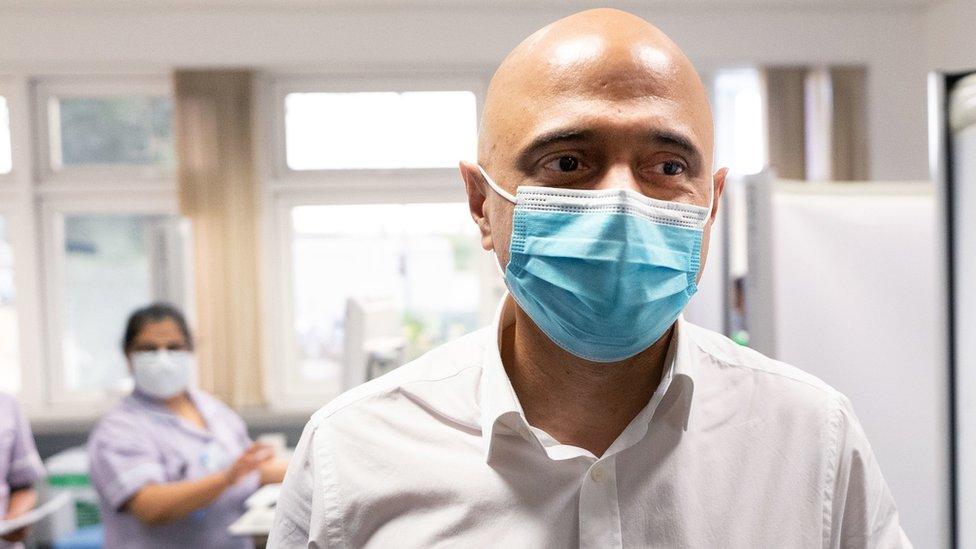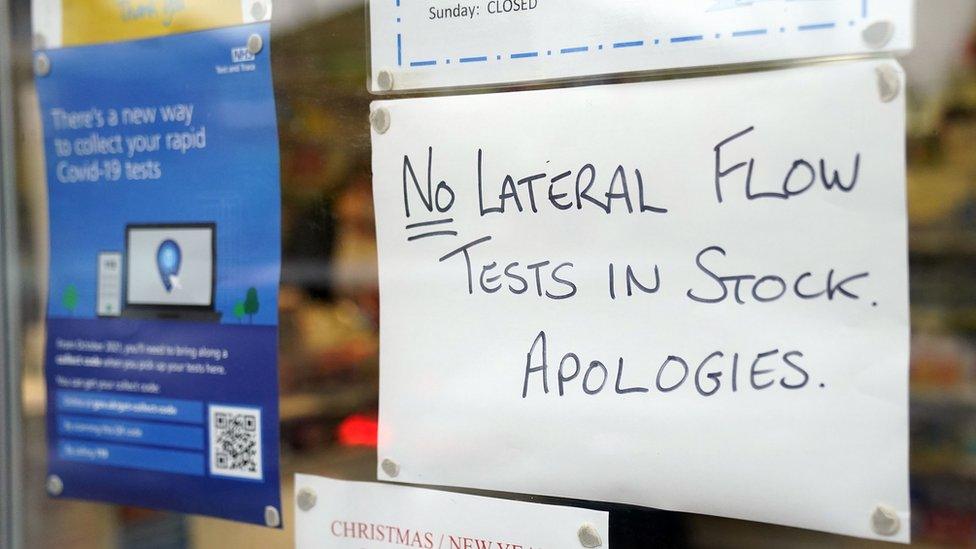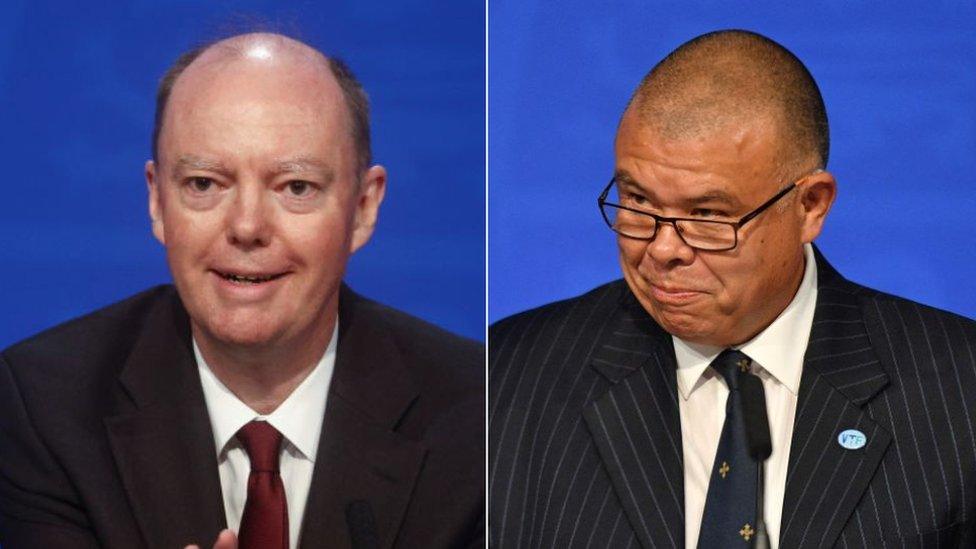Covid: More restrictions a last resort, Sajid Javid says
- Published

Further Covid restrictions in England must be an "absolute last resort", Health Secretary Sajid Javid has said, despite rising case numbers in the UK.
Writing in the Daily Mail, external, Mr Javid said the UK must look to "live alongside" coronavirus in 2022.
The number of people in intensive care was not following the same trajectory as this time last year, he said.
But he warned there would be a big increase in the number of people needing NHS care in the next month.
This is "likely to test the limits" of NHS capacity more than a typical winter, he said.
Meanwhile, Chris Hopson, the chief executive of NHS Providers which represents NHS trusts, said hospitalisations with Covid-19 were now increasing across the country, following the pattern seen in London.
He said people still did not know what would happen next and there were some worries about the impact of intergenerational mixing over the Christmas period.
Matthew Taylor, chief executive of the NHS Confederation, which represents health service organisations in England, Wales and Northern Ireland, said the next few weeks would be "very tough".
On Friday UK daily Covid cases reached another record high of 189,846.
New Year's Eve celebrations were scaled back across much of the UK as the more infectious Omicron variant continues to drive up cases.
England is currently under the government's Plan B restrictions which mean face coverings are compulsory in most indoor venues and on public transport, while people should work from home if they can.
The government resisted calls to impose new regulations in England in the run-up to the new year, diverging from Scotland, Wales and Northern Ireland, where tighter rules are now in place for pubs, bars and restaurants.
Mr Javid said England had "welcomed in 2022 with some of the least restrictive measures in Europe".
He said: "Curbs on our freedom must be an absolute last resort and the British people rightly expect us to do everything in our power to avert them.
"Since I came into this role six months ago, I've also been acutely conscious of the enormous health, social and economic costs of lockdowns.
"So I've been determined that we must give ourselves the best chance of living alongside the virus and avoiding strict measures in the future."

There have been shortages of lateral flow tests across the country
But Mr Javid said the pandemic was "far from over".
It was inevitable there would be a big increase in Covid patients requiring NHS treatment over the next month, he said, because of the lag between infections and hospital admissions.
Friday's coronavirus figures showed daily hospital admissions were up to 1,915, as of 27 December, compared with 1,506 the previous day.
There was also a further 203 deaths within 28 days of a positive test.


The problem facing the government is that the window to suppress the peak with restrictions may already have passed.
Modelling produced for government by Warwick University suggests even a return to lockdown with only schools open has virtually no impact on hospitalisations now.
To have had a significant impact, measures would need to have been introduced on Boxing Day or a week earlier.
But even then the argument for them was unclear - in both scenarios infections and hospitalisations rebound once restrictions are lifted. Largely all it achieves is delaying and spreading out illness.
That could have been of benefit by evening out the pressure on the NHS.
But there is, of course, the wider costs of restrictions to society, the economy and mental health to factor in.
Some say it would also have bought you time to carry out more vaccinations, but with nine in 10 of the most vulnerable boosted and evidence protection wanes over time this may actually be the point in time when we have the most immunity across the population.
There are no simple solutions to this Omicron wave - and the options that the government did have may well have gone.

Mr Hopson said at the beginning of last week there had been concern from London trusts about the daily growth in hospitalisations, which was around 8%, but that had come down to 4% to 5% on Friday and Saturday.
"We are still not seeing the large numbers of severely ill older people that we have seen in previous peaks", he said, adding that intensive care occupancy was broadly stable.
The sheer volume of patients, combined with Covid-related staff absences across the health sector, would become the "biggest concern" if sustained, Mr Hopson said.
Matthew Taylor, chief executive of the NHS Confederation, said that he hoped people had "a great time" on New Year's Eve but said it was important not to be complacent.
"I understand how much people want things to return to normal and I'm confident that, as this year progresses, we will be able to do that.
"We all hope that 2022 is the year in which coronavirus just becomes an illness that we live with, not an illness that dominates our lives.
"But you can have the optimism but still recognise that the next few weeks are going to be very tough, and we need to do whatever is necessary to get us through these next few weeks," he said.
The country had to press on with the booster programme, he said, but warned that NHS leaders may have to make tough decisions - which could include stopping visitors to hospitals.
Case numbers 'daunting'
A leading statistician who advises the government said the UK's daily Covid-19 cases could be closer to 500,000 due to the testing system being overstretched and reinfections not being counted in the government data.
Prof Sir David Spiegelhalter of the University of Cambridge told the BBC: "This is a huge, unprecedented wave of infection and very daunting."
But he added that deaths were "not yet going up" and that the country could be "fairly optimistic" about avoiding the kind of pressures seen during the last winter wave.


LAURA MVULA'S MUSIC ROOM: The star on the music that has got her through 2021
SIMPLE PLEASURES: Sandi Toksvig explores the Danish notion of hygge

Related topics
- Published1 January 2022

- Published31 December 2021
